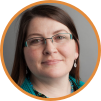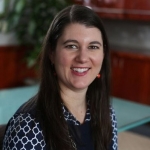Since its inception in May 1949, the National Alliance of Mental Illness (NAMI) states that Mental Health Awareness Month (annually in May) “has been a cornerstone of addressing the challenges faced by millions of Americans living with mental health conditions.”
While an estimated one in four Americans ages 18 and older have a diagnosable mental disorder in a given year, work-related stressors impact everyone in prospect development, across organization types and work environments.
We approached this Mental Health Awareness Month as an opportune time to highlight several Apra members and ways they routinely care for their mental, physical and emotional well-being in part one of this two-part series.
 Ruthie Giles, Director of Prospect Research and Management, University of New Hampshire (UNH); Partner, Staupell Analytics Group
Ruthie Giles, Director of Prospect Research and Management, University of New Hampshire (UNH); Partner, Staupell Analytics Group
Time in prospect development: 24 years.
Work environment: Fully remote since February 2023.
I’ve been remote in my Staupell role since 2021. During the COVID-19 pandemic, in my previous full-time role, I opted to go into the office daily when most colleagues worked from home. I was practically the only person there and enjoyed having my own office.
Transitioning to being entirely remote in early 2023 when I came to UNH worked well for me. I needed to be more available to care for my mom, who had a stroke and was struggling with dementia. It was and is nice not have to ask permission to care for your family in a remote environment.
My husband works third shift at his company and is usually home sleeping while I’m working. Our schedules make it easier to run errands, care for our parents and walk our rescue dog, Harley, than if we both worked in an office. In my home office, I have two desks: one for UNH and one for Staupell. I typically shut my UNH computer off at 5 p.m. and roll over to my Staupell desk to do consulting work.
Frequency of seeing colleagues in person: I’ve been to the UNH campus twice in my first year. I see my Staupell colleagues occasionally at conferences or client events.
Biggest daily stressors or professional challenges: These are usually rush requests, as well as family situations. It’s important to make space for others to be present with their family, while still meeting our deadlines.
Ways to mitigate stressors: I go to the gym twice Monday through Friday and then over the weekend to lift weights. I try to go at a quiet time to get the bench or other equipment I need.
During the workday, I try count to three before responding in a stressful situation. I remind the six people on my UNH team that stressful moments are temporary and we’ll get through them. When scheduling meetings, I keep the lunch hour, school pickup times and end of the day clear so my direct reports can do what they need to during these timeframes.
Advice for those new(er) to remote work: Realize remote work isn’t for everyone, especially for those needing in-person interactions and reactions.
Recommended resources: None specifically; I read a lot about better management and meeting practices from books and LinkedIn posts from people in my network.
 Tim Wilson, Prospect Management and Research Manager, Weber State University; Founder and Host, People in Fundraising podcast
Tim Wilson, Prospect Management and Research Manager, Weber State University; Founder and Host, People in Fundraising podcast
Time in prospect development: Almost 25 years.
Work environment: Hybrid since September 2021.
I work from home on Mondays, Wednesdays and Fridays, and on campus Tuesdays and Thursdays, where I arrive by 8:30 a.m. or 9 a.m.
At home, my workday is more fluid. I like structure, so this took some getting used to. I check my inbox around 7 a.m. or 7:30 a.m., say goodbye to my kids and wife before they go to school and work, then begin working at 8:30 a.m. If I have an on-campus meeting on a work from home day, I still have autonomy over my hours and location for the remainder of the day.
Frequency of seeing colleagues in person: Twice a week, throughout days I’m on campus.
Biggest daily stressors or professional challenges: Having enough time and resources to support our fundraisers: I support 11, soon to be 12.
Ways to mitigate stressors: I begin each day with prayer.
During COVID, I became intentional about going outside for walks and still do this, especially on campus. I often ask fundraisers to join me — not to talk about work, but to have space to discuss whatever is on their minds or need help with. This has been great for building social trust.
When working from home, I use my lunch hour to go to the gym; when on campus, I go to the gym on my way home. Additionally, my employer allows staff three wellness hours per week, something others can potentially advocate for with their own employers. These hours can be used for activities like exercise, meditation and therapy, with managerial approval.
As an organization, we don’t send emails before 8 a.m. or after 5 p.m. Other boundary-setting includes blocking off two to four hours to complete project work. I learned the hard way not to stack hour-long portfolio review meetings back-to-back. Instead, I shortened these to 45 minutes each, keeping them succinct and focused. Finally, I aim to use LinkedIn minimally on Saturdays, and not at all on Sundays!
When I first started my podcast, “People in Fundraising,” I was on fire to find interested speakers. I encourage others not to have a sense of urgency to respond to messages or posts. Not everything needs an immediate response or reaction.
Advice for those new(er) to remote work: Be gentle with yourself — especially when it comes to feeling a need to prove yourself by showing your productivity. A former manager once said “Happiness is expectations managed, including your own.”
Recommended resources related to hybrid work: This blog posting on tips for a better computer-centered workday from the Helen Brown Group. My daughter, Amelia, created this daily organizer that I use to check on how I'm progressing in some categories, and where I can use extra energy and attention for self-improvement. Others may be able to adapt and use something like this, as well.
 Tami Pearson, Prospect Research Analyst, Nuvance Health
Tami Pearson, Prospect Research Analyst, Nuvance Health
Time in prospect development: 14 years (my entire 25-year career has been in fundraising!)
Work environment: Remote, since early 2020. I was the first remote hire for our fundraising team.
Frequency of seeing colleagues in person: At least twice a year: around the holidays in December and once in the summer. This year, we’re adding at least one event to welcome new team members. These meetings are a little business and much more team bonding with fun and games!
Biggest daily stressors or professional challenges: Email. I think this is the case regardless of one’s organization, since fundraisers are all remote, in some way: across campus, in different buildings or on the road. Nuvance has seven hospitals and the email volume is extensive. I’ve given up trying to organize my inbox, since the search function works well!
Ways to mitigate stressors: I’ve learned to pick up the phone about a challenging email. Often, people aren’t trying to be difficult on purpose. Talking things out helps determine that.
I incorporate a lot of movement into my day. I do yoga for 10-15 minutes, sometimes during lunch or another break. I listen to music, and having a standing desk helps me dance! After work, I do physical training.
One way to mitigate stress more broadly can be changing your career path and focus. I was previously director of advancement services for a small college and eventually wanted to focus on research; database management and gift processing were stressful. Finding a career coach was helpful, and I highly recommend using one. It’s part therapy and focuses on what you’re good at doing. My career coach helped me find my current role.
Advice for those new(er) to remote work: Make sure to set up your workspace with equipment like extra monitors if you don’t work well from just a laptop.
Schedule time for breaks and focused work. Try not to get distracted by things around the house. When I take breaks, I don’t want to spend that time cleaning. Sometimes, I stand outside to have time outdoors and in the sunlight.
Finally, do nice things for yourself during the day! This could include splurging for lunch out as you might in an office.
Part two of this series features peers in remote, hybrid and in-person roles. Read it online here.


Jennifer Huebner
Director of Prospect Research, The Humane Society of the United States
Jennifer Huebner has worked in philanthropy full-time since 2011, after first being introduced to fundraising as a student caller at the College of William and Mary. She held various roles within prospect research and management, program administration and leadership annual giving at the University of Virginia and George Washington University, and within prospect research and stewardship at Episcopal High School in Alexandria, VA before beginning her current role as director of prospect research with the Humane Society of the United States (HSUS) in September 2023. Prospect research has been Huebner’s primary professional interest and area of specialization for a total of 10 years. At HSUS, Huebner leads the prospect development team in providing donor intelligence to the CEO, senior staff and frontline fundraisers in a variety of formats, while supporting prospect discovery efforts and the team’s overall strategy.
Huebner has been involved with Apra’s Content Development Committee and its predecessor committees for a total of seven years, beginning in 2013. Outside of work, she adores spending time with her senior toy poodle, Fancy (who she rescued in 2020) and running.